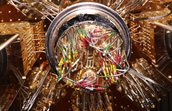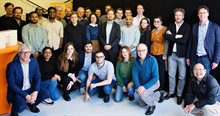Orange Quantum Systems
Quantum computing technology is rapidly evolving from an interesting research area into a full-blown industry. And as companies scramble to establish their place in the emerging quantum value chain, a TNO spin-off is claiming a unique position that can benefit the entire quantum ecosystem. Orange Quantum Systems (OrangeQS) offers the first system in the world for effective testing of quantum chip performance.

Removing the roadblocks
The power of quantum computing lies in the integrated circuit-based quantum chips made up of superconducting or semiconducting quantum qubits. To achieve the potential of these chips, tens of millions of qubits must perform flawlessly. Through quantum entanglement, every added qubit adds computing power, but also raises the sensitivity of the chip and its susceptibility to thermal noise, electromagnetic interference or imperfections. And even the smallest flaw can render a quantum chip useless. Unlike with regular semiconductor chips, traditional electronic or optical testing cannot measure quantum chip performance.
As part of QuTech, the team that developed Quantum Inspire, the first quantum computer in Europe with cloud access, developers at TNO became experts on the challenges and bottlenecks to effective chip-making. Among these challenges: accurate and reliable testing of chip performance. Instead of becoming computer makers themselves, the team recognised the opportunity to drive the entire quantum ecosystem forward by addressing this key bottleneck. When it initially spun off from TNO, OrangeQS offered tools to quantum chip R&D teams to accurately test a variety of chip designs. Today, OrangeQS is supplying industry-ready test equipment to quantum computer and chip manufacturers.
Pioneering the change
As pioneers in the quantum chip testing space, OrangeQS continues to optimise its testing systems for speed, efficiency, and cost-effectiveness. But also to prepare for next-generation quantum chips not yet in development. They are addressing the challenges of innovating in an entirely new space and leading the development of effective testing protocols.
The team has already used standardisation and automation to significantly reduce testing time and cost-per-qubit for their existing hardware and software systems, but they continue to take steps towards further optimisation by examining and improving each step of the testing process. OrangeQS has received both VC funding and an EIC Accelerator grant to continue their work. EIT Digital also recently named OrangeQS a Champion in European Deep Tech

Supporting the ecosystem
As of today, OrangeQS is able to offer quantum computer or quantum chip manufacturers a commercially ready testing system. The OrangeQS Industry system is an optimised hardware and software package that offers rapid testing and lowest cost per qubit for high-throughput chip production. On the other hand, the OrangeQS R&D system is still available to quantum chip R&D teams who need the flexibility and adaptability to test small numbers of a variety of chips in a short amount of time. Both products combine proprietary testing protocols,selected measurement and control hardware and cryogenic hardware components proven to provide certainty about chip performance. OrangeQS can also supplement companies’ existing testing equipment with the hardware or software needed to complete their quantum chip testing systems.
By choosing to support the entire quantum value chain instead of joining the competition among manufacturers, OrangeQS is remaining true to its roots as a TNO spin-off. Instead of becoming ‘yet another quantum system integrator’, the company is helping to drive the entire quantum value chain forward by offering a solution to one of the key bottlenecks for development of quantum chips. Improving and standardising effective testing, and making it available to all manufacturers, will help stimulate and accelerate development and bring the potential of quantum computing closer than ever before possible.
Ready to solve your quantum chip testing challenges with a single system?
